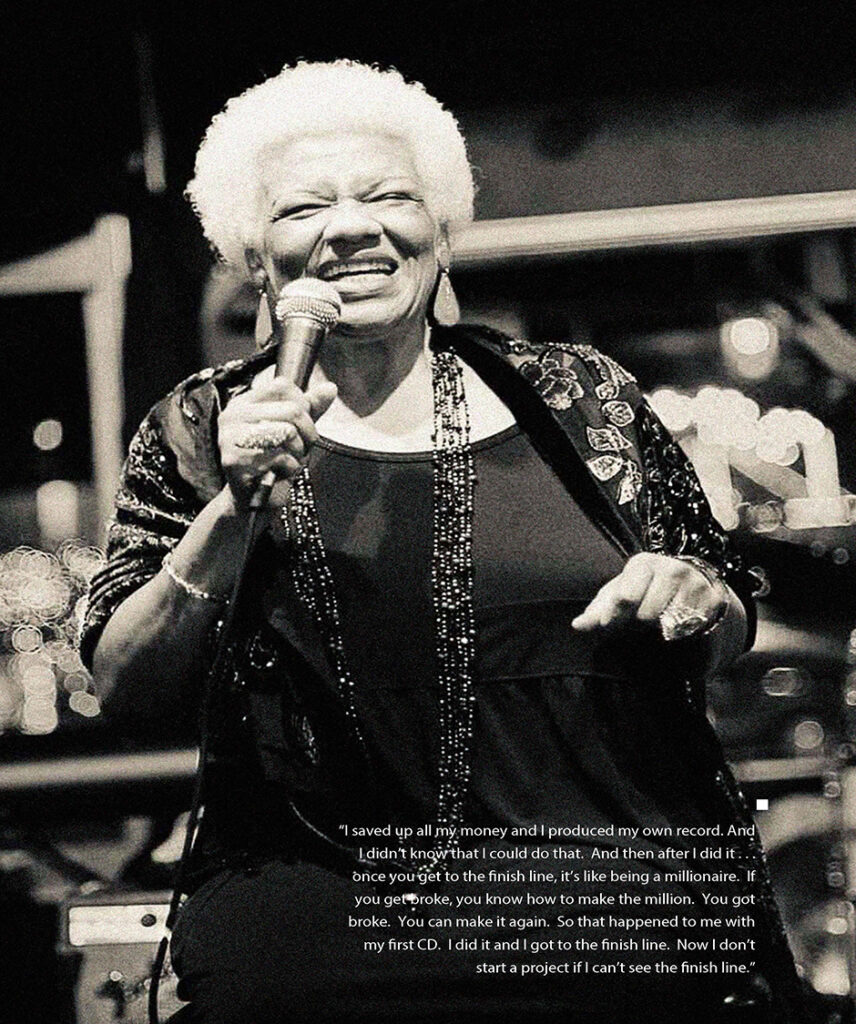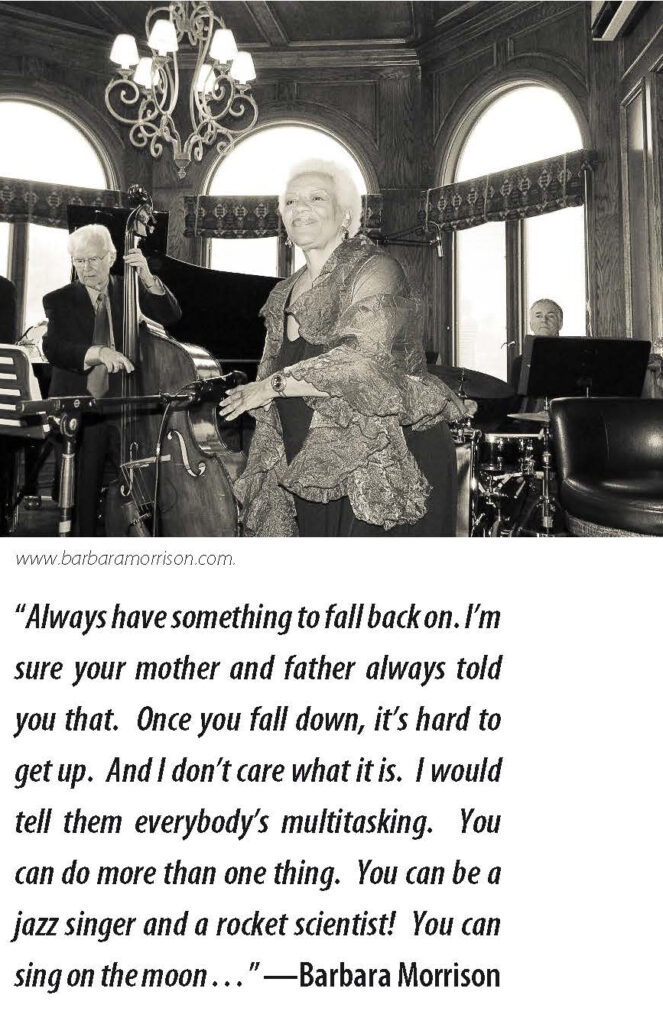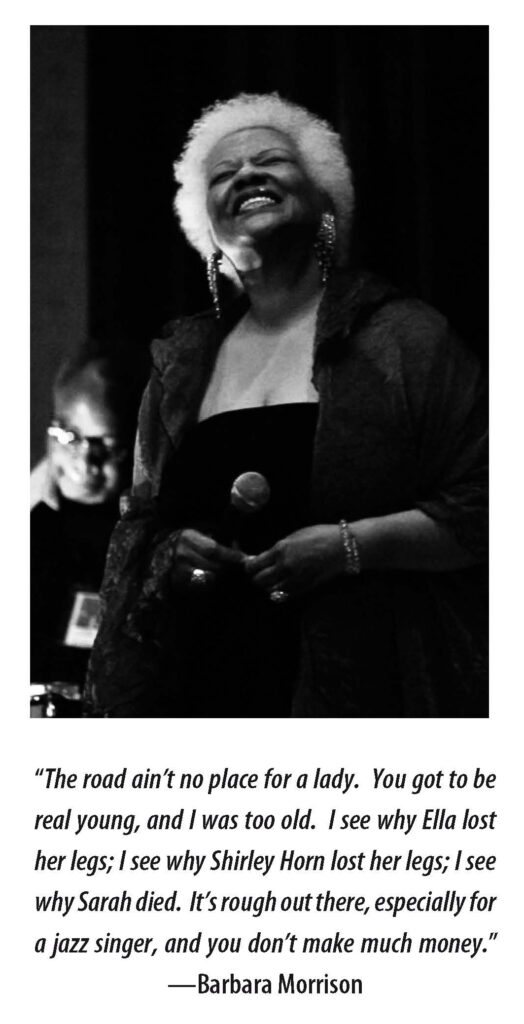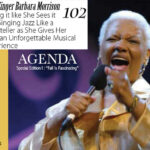“This interview was given 7 years ago for the very first print special edition of Agenda, which was published in 2014. Barbara Morrison recently left us on March 16, 2022, and though many have read and enjoyed this interview in print, I thought it would be a wonderful tribute to repurpose it on Agendamag.com.”
–Kaylene Peoples, Editor in Chief
Those who want to get lost in a melancholy ballad won’t be disappointed when they listen to jazz crooner Barbara Morrison. I first saw Morrison perform at Catalina Jazz Club last fall. I was instantly transfixed by her smooth and soulful vocals. What struck me as most endearing was her way of sucking you in while singing a story. And her songs are just that . . . classic stories from classic covers, but sung in a narrative so enchanting that you can’t help but want to hear more. And I did want to hear more. With her versions of “Smile,” “I Loves You, Porgy,” and other favorites, you feel as if you’re hearing these songs for the very first time. Now that is difficult to do! Making a well-covered tune new again is no easy task; yet Barbara Morrison not only produces that feat with every song she sings, but she leaves us feeling as though she gave us a piece of her ridiculously talented soul. I will never forget that amazing performance that night at Catalina’s.
I had the pleasure of interviewing Barbara Morrison. I want so badly to reference her as a diva. She deserves the title. However, she is no diva in her demeanor. Morrison is one of the most humble performers of her level that I have ever met. Her graciousness on stage and her knack for making her audience feel as if they’re in her living room is a skill all musicians should use more often. Though with her it seems that it was just part of her personality, which was evident during our interview.
Barbara is no newcomer to the music industry. She recorded her first radio appearance in Detroit when she was only ten years old. She moved to Los Angeles when she was 23 years old and performed with her band all over the United States, Western Europe, the Far East, and Australia. She later performed with the Philip Morris Super Band, touring Canada, Australia, Japan, and the Philippines. Barbara sang with a number of legends, including Jimmy Smith, James Moody, Kenny Burrell, and more. The musicians with whom Barbara performed is impressive; and after a televised tribute to Ella Fitzgerald, with Mel Tormé, Diane Reeves, Stevie Wonder, Chaka Khan, Tony Bennett, Dionne Warwick, and Lou Rawls, Morrison continued to perform at famous jazz festivals, Carnegie Hall, and even the Sydney Opera House in Australia. Now Barbara is performing a tribute to Billy Holiday.
Interview questions by Kaylene Peoples
Responses by Barbara Morrison
(Performance from Catalina Bar & Grill on 7/11/2013)
Kaylene Peoples: This is the first time I ever saw you live. I have to tell you I was really impressed. I was blown away by a few things. One, your song selection was really eclectic; and two, a singer with such control and choice of when you let go and when you held back spoke of a really seasoned performer. How did you feel about your performance tonight?
Barbara Morrison: I felt really good tonight. One of the things that really happened to me I was really stressed out not only getting here, but before I got here I had a really good set, and the part with the big band. So all the way here I kept saying “I’m ready. I’m ready.” The other thing that had me all hyped up was no traffic. None! I came straight here. I thought I was going to be half an hour late and I was right on time. So everything went my way tonight. I never worry about the band because I worked with them for seven years. That’s why the CD is so tight. Everything is so tight. You’re looking at somebody that had a real nice evening.
Kaylene: You looked really relaxed up there for sure.
Barbara: I was singing songs out to the people.
Kaylene: I loved how you engaged the audience anyway. We felt like we were part of your show.
Barbara: You are. I think one of the highest compliments an entertainer can have is to have people go and work hard all week and they take their $20 or $15 and they come and see you. I think it’s a high compliment. Because you can go anywhere else; there are so many places in California . . . in Los Angeles! But when people take the time out to come and see you, you should have some fun with them.
Kaylene: Tell me about some of the songs, and in particular, “Porgy and Bess” is a song I always want to do but can never get the band to do it; so I never get to perform it. When I heard the first two chords of that song, and I realized what song it was, I was like, “Ah . . . No!”
(Barbara Laughs.)
And then “Smile” is another one that you don’t hear often. And done so well . . . and done different . . . I loved how you combined the two songs. Tell me about how you come up with your songs and your process.
Barbara: “Make Someone Happy” and “Smile” happened one night when we were just working and I did it, and it was so magical, we just kept it in the show. But I have no idea why I did it. I just felt like they should be connected. And I’ve always wanted to do “Porgy” of course. When I was in Australia a couple of years ago, I went to see a Houston company do a production of Porky and Bess. I always say “porky.” And it was so good. Actually, it was about five years ago. I just fell in love with that lady. I fell in love with the way she did it. But you know what? I have been loving that song. I’m just like you. There’s a lady. Her name is Deborah Brown. She’s from Georgia. She teaches in the Netherlands. She teaches voice. She had the most beautiful rendition of that, and she did it with the most beautiful tenor/bassist called John Clayton. And I thought to myself, this is just one song I am not going to let get away. There are a few songs I won’t mess with because I can’t hear very well. I can’t hear the intervals very well, so I always go flat. So I thought, “Let me pick up my strong points.” And my strong points are feelings. My strong points are telling a story. So if I mess up, so what. I can tell a good story.
Kaylene: I can tell you right now, I didn’t hear any wrong intervals tonight.
Barbara: (Barbara laughs.) That was another reason I was in such a good mood, because I sat in the park the other day with you . . .
(A colleague and I had met with Morrison after a performance at her performing arts center in Los Angeles.)
. . . and it was cold and so I lost my pipes. So I went home, kind of shut down and took some cough syrup, and tonight everything fell in sync, and whoa! But I had a few pitch problems that I wouldn’t normally have had. But it’s not going to go away until I’ve had some rest. Well, you know that. You’re a singer.
Kaylene: You know, sometimes what you might consider pitch problems, you’re probably doing a 3rd above a note that you might have done a different note on. Because you’re a jazz/blues singer, so you know how to stay within the key. Maybe you’re not off, you’re just improvising. (Both laugh.) So how do you come up with your stories? Are they spontaneous?
Barbara: Most of them are true, but I’m a jokester. But I try to draw from my life experiences. Some things like my father coming in the room saying, “You guys are lucky, you get me. All I get is you.” That’s true. Ha, ha. Stuff like that.
Kaylene: I also loved the story before you introduced Billy Valentine. How you heard the song, and you fell in love with it. It was just . . . not planned, right? Off the top of your head!
Barbara: Some things . . . you just really feel them.
Kaylene: What would you say have been the highlights of your career?
Barbara: One of the highlights was meeting Ella Fitzgerald. Another was my first world tour. I had a really, really good experience. It was for like 30 dates. Thirty dates I went out on the road with some of the top jazz players in the world, James Moody, Jimmy Smith. Another really big highlight was I saved up all my money and I produced my own record. And I didn’t know that I could do that. And then after I did it . . . once you get to the finish line, it’s like being a millionaire. If you get broke, you know how you made the million. You got broke . . . you can go make it again. So that happened to me with my first CD. I did it and I got to the finish line. Now I don’t start a project if I can’t see the finish line. I don’t mess around. Once I start it, I don’t care. I don’t care what you say, how much trouble it takes, cause nothing beats a failure but a try. Now I am 63 years old with a record contract. You know what I’m saying? Some of the stars that have made it—like Marla Gibbs and Red Foxx—they didn’t make it ‘til their 60s or 40s, whatever, but how many jazz singers you know who come out the box at 63 years old?
Kaylene: I know one.
Barbara: That’s what I’m trying to tell you! It’s one of the highlights. She might be 63, but she has the soul of a 21-year-old! (Both Laugh) I’m having a ball.
Kaylene: You make us love you. Again, it was the first time I saw you perform live, and I was just smiling. I was getting chills on some of the song selections. Like how you emoted. You do this thing where you’ll sing and then you go into yourself. You bring us into you. You’re actually bringing us . . .
Barbara: That’s where people want to go. I find it hard to believe that everybody doesn’t at one time want to be in the spotlight. I don’t care whether it’s at Xerox.
Kaylene: We all wanted to be you tonight.
Barbara: Now that makes me feel good.
Kaylene: Can I touch on a sensitive subject, and if you don’t want to talk about it, you don’t have to? You have an illness. Is that diabetes-related?
Barbara: Uh huh!
Kaylene: My father had diabetes, so I know the struggle. How are you handling it, and how is that affecting your career, if at all?
Barbara: Well, it does. I can’t lie. I hate the part where you have to take medicine and shots. That’s probably why I’m in the condition I’m in. I’ve stayed in denial for a long time. “Who, me? I’m not sick. Those people are crazy.” And it caught up with me. Now I have to be a little bit more serious. Every now and then I’ll have a beer. I’ll eat something greasy. But when the doctor explains it to me, he explains it to me like this: “Barbara, you stay in control as much as you can. Then you can have a beer. Then you can have a hamburger.” So that’s what I try to do. When I wake up in the morning, I take my sugar. If it’s over 120, I lay low. You know what I mean? So it’s about the numbers. After you eat, they automatically go up. So the part that hurts you is when they go like this: Up an’ up, up and up. So you’re shooting . . . so far I’ve been doing pretty good. But sometimes I get frustrated. I’m in a wheel chair and I can’t get down the hallway. My house is not handicap accessible. Right now my arms are really sore. They’re in good shape, but they’re sore as hell. Wheelchairs . . . walker . . .
Kaylene: You made a comment on stage. That’s why I’m asking.
Barbara: The blade runners? (Both laugh.)
Kaylene: Yeah.
Barbara: This is serious stuff. I went to Busters and the guy there, he just walked right up to me and he said, “Hey, Barbara, how are your legs doing?” At the time, to me felt really heavy. So he lifted up his pants. I said whoa! He had two prostheses. And I said, “Whoa!” I asked him where he got those. He said, “I made them.” He has a company in Santa Monica. He said, “Why don’t you come out and let me make you a pair of legs.” His legs looked way better than what I had. They don’t look like prostheses. They look really strong and sturdy. So I’m going to try those out. And then I was on the plane the other week, and this [other] guy stepped on my foot. He said, “Oh, excuse me.” I said, “Don’t worry about it. I can’t feel it.” So he sat down across from me. And he owns a company that makes prostheses. He had two [prostheses]. And you know what he did? He controlled them from his cell phone.
Kaylene: You know, I heard of that.
Barbara: Yes, just came out of MIT.
Kaylene: So he’s going to help you out?
Barbara: Well, he offered. I haven’t called him. I like the other guy.
Kaylene: Well, you know what? The good thing is you have his number so if the first one doesn’t work out to your expectations, you can always call the other guy.
Barbara: So I’m constantly meeting people. Then I saw a guy out in San Bernardino who had a little small motorized wheelchair. I said, “I need a small wheelchair like that one.” He jumped out of the chair and said, “Here try mine on!” He pulled up his pants and he had two prostheses on. And I said whoa. He’s a ski instructor.
Kaylene: Yes, I know you can do so many things now. You might become a parachuter after this!
Barbara: I’ll tell you one thing. It’s not going to get me down. I’m a do my thing.
Kaylene: I love your spirit. Let’s talk about a couple more things, your performing arts center. How did you start that? What was your motivation?
Barbara: My motivation was to come off the road. I had been on the road for so long. When I got off the road, then I started the performing arts center; and then this happened (pointing down at her prostheses). My main goal was to come off the road and just stay home. The road ain’t no place for a lady. You got to be real young, and I was too old. I see why Ella lost her legs; I see why Shirley Horn lost her legs; I see why Sarah died. It’s rough out there, especially for a jazz singer, and you don’t make much money. I think one of the things that broke Sara’s heart was Anita Baker, who’s a wonderful R&B singer. Sarah Vaughan was one of her idols. She loved Sarah Vaughan. And she had one record, and made more money than Sara made in her lifetime. That kind of hurts. I’ll tell you one thing. It’s not going to get me down. I’m a do my thing.
Kaylene: Isn’t it when you’re doing jazz or genres linked to jazz, it’s really more about the love of the art than it is about making a lot of money?
Barbara: It’s a cult following. There’s no money in it. Most jazz people die broke. If you look through the history, people like Miles . . . Ray Brown . . . Ella was a millionaire. She managed to have some money. Look at Amy Winehouse. She just died. She was 27 years old. She had more money than Ella Fitzgerald, and Ella was 78.
Kaylene: What advice would you give to a young . . . I’m going to keep it gender specific because you are a female. What advice would you give to an emerging up and coming jazz female musician/singer?
Barbara: The same advice I give everybody. Finish school, number 1. Always have something to fall back on. I’m sure your mother and father always told you that. Once you fall down, it’s hard to get up. And I don’t care what it is. I would tell them everybody’s multitasking. You can do more than one thing. You can be a jazz singer and a rocket scientist! You can sing on the moon . . . Keep it moving. Don’t get stuck. People get stuck and they . . . When I try to get my website designed and I don’t hear from them for a long time and they take my money . . . and I’M STUCK! But if I go in and learn how to do it myself . . . that’s what I did. I went and said, “I know how to click, click, click, and move.”
Kaylene: Tell me about social networking. Is that helping you?
Barbara: I do a lot of it. I’m sorry it didn’t work so well tonight, but we had a nice crowd. Normally, it’s bulging at the seams. Here’s what you have to look at, the pay periods. Today’s the 11th. You don’t get paid till the 15th. If a pay period’s coming up, you’re not going to have as many people as you would if it was the day after payday, on a Friday. This place would be smoking. I’m kind of like a go-to girl when somebody cancels.
Kaylene: Well, that’s good. They know you can bring people.
Barbara: Playboy does it, too. “So and so can’t make it.”
Kaylene: Awe, shame on them! You should be first on the list.
Barbara: Sometimes it’s not too good when a female is running the show. Females have a different look. Men look at the color of money. Females are more like, “I don’t really like her eyebrows . . . nails.” You know what I’m saying? We have a different war. You’re going to find when you deal with females on your shows and booking them, they’re just a little bit harder. They have an excuse to go back and tell their boss, “She didn’t get her picture in on time.” Their checklist is different.
Kaylene: Seems catty!
Barbara: Yeah. But now and then you get a female that knows what to do, nose to the grindstone, everything works out wonderful. Edna Moore, on my first world tour, she was the “baddest” you-know-what in the tour. Everywhere I went, she even had them take out tarp and mark every spot for the instruments on stage, close it up at night and take it to the next venue. So when you walked in from that tarp, all the instruments were in the exact spot. She was “baaad.” So sometimes when you get a hardworking female, you get everything you want. I’m probably the lowest maintenance. Some places don’t even have a dressing room.
BARBARA MORRISON
B. September 10, 1949 — D. March 16, 2022
Purchase Link: AGENDA Special Edition I – “Fall Is Fascinating” 2014









